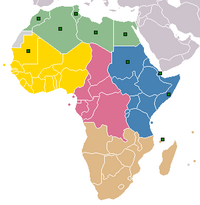Portal:Football in Africa
Introduction
Football is the most popular sport in Africa. Indeed, football is probably the most popular sport in every African country, although rugby and cricket are also very popular in South Africa. (Full article...)
This section may be unbalanced towards certain viewpoints. (October 2022) |

Selected article -
The Libya national football team (Arabic: منتخب لِيْبيَا لِكُرَّةُ الْقَدَم) represents Libya in men's international association football and it is controlled by the Libyan Football Federation. The team has never qualified for FIFA World Cup but has qualified for editions of Africa Cup of Nation in 1982, 2006, and 2012. In 1982, the team was both the host and runner-up. In the Arab Cup, Libya finished second in 1964 and 2012, and third in 1966. The team is affiliated with both FIFA and Confederation of African Football (CAF).
Due to political circumstances, Libya has typically been less successful in international competition compared to other North African teams like Algeria, Morocco, Egypt and Tunisia. Libya has never qualified for the FIFA World Cup and its participation in AFCON is sporadic, having only qualified for three AFCON editions.
Since the 2010s, Libya's global ranking has improved due to the increasing number of Libyan players playing in foreign leagues. In the 2012 Africa Cup of Nations, the team recorded their first-ever win in the tournament outside Libya. Their FIFA world ranking rose to a high of 36 in September 2012; Libya then won a gold medal in the 2014 African Nations Championship. However, the Libyan Civil War caused the stoppage of the Libyan Premier League and severely disrupted domestic affairs. Libya was eliminated in the first round of the 2015 Africa Cup of Nations qualification by Rwanda and failed to qualify for the 2016 African Nations Championship as the defending champions.
Selected biography -
Born in Ajaccio, Khazri started his career with local side Jeunesse Sportive Ajaccio before moving to SC Bastia. He received his first call up to the senior squad for their match against Amiens SC on 20 February 2009. After five years in Bastia, Khazri signed a four-year contract with FC Girondins de Bordeaux in July 2014, where he made 64 appearances over two seasons before signing for Sunderland in January 2016.
After making his debut for the Tunisia national under-20 team in 2009, Khazri went on to represent France at under-21 level before switching allegiances again to represent Tunisia at the 2013 Africa Cup of Nations. Khazri also represented Tunisia at the 2015 and 2017 competitions.
Selected image -
 |
Members of a 1960s Ghana national team pose with some of their trophies. The Ghana national team has won the Africa Cup of Nations four times, and is one of only three African teams to have ever reached the quarter-finals of a FIFA World Cup finals.
Subcategories
Related portals
More sports portals
WikiProjects
Related task forces and sub-projects
African football task force
WikiProject Africa • WikiProject Football
WikiProject Football task forces and sub-projects
 | |
| Wikipedia ads | file info – #250 |
Topics
Open tasks

- Expand stubs: Competitions in Africa • Organizations
- Expand club articles of teams from Africa.
- Expand biographies of Africans involved in football.
- Create: Requested articles • Most wanted football articles • Requested general football articles
- Add: Infoboxes • Images (General requests, Requested images of people)
- Review: articles currently under review
- Assess: Assessment requests • Assess an article
- Revert vandalism on this portal and on African football articles
- Assist in maintaining this portal and keeping its selected content up to date.
- WikiNews: Create and submit news stories about African football for Wikipedia's sister project WikiNews.
Associated Wikimedia
The following Wikimedia Foundation sister projects provide more on this subject:
-
Commons
Free media repository -
Wikibooks
Free textbooks and manuals -
Wikidata
Free knowledge base -
Wikinews
Free-content news -
Wikiquote
Collection of quotations -
Wikisource
Free-content library -
Wikiversity
Free learning tools -
Wiktionary
Dictionary and thesaurus
More portals
Sources

- ^ "The History Of Soccer In Africa". NPR.org. 2010-06-09. Retrieved 2016-03-31.
- ^ a b c Alegi, Peter (2010). African Soccerscapes. Ohio University Press. pp. 1–2. ISBN 9780896802780.
- ^ Frimpong, Enoch Darfah. "Ghana news: A world of superstition, frustration and disillusionment - Graphic Online". Retrieved 23 September 2017.
- ^ Lacey, Marc (8 August 2002). "Kangemi Journal; For Spellbinding Soccer, the Juju Man's on the Ball". The New York Times. NY Times. Retrieved 2016-03-31.
- ^ "World Cup Witchcraft: Africa Teams Turn to Magic for Aid". National Geographic. Archived from the original on July 10, 2006. Retrieved 2016-03-31.
- ^ Andy Mitten (September 2010). The Rough Guide to Cult Football. Rough Guides UK. ISBN 9781405387965. Retrieved 2016-04-02.
- ^ "African Nations Cup overshadowed by hocus pocus | Football". The Guardian. Retrieved 2016-04-09.
- ^ Kuper, Simon (2006). Soccer Against the Enemy: How the World's Most Popular Sport Starts and Stops Wars, Fuels Revolutions, and Keeps Dictators in Power. Nation Books. p. 123. ISBN 978-1-56025-878-0.
















